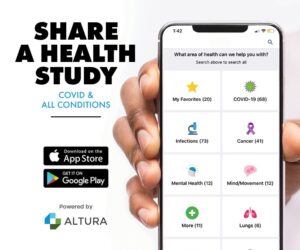On Behalf of Altura – Virtual Clinical Trials (VCTs) may not be the norm anytime soon, but proactive sponsors, study sites, and healthcare systems that conduct clinical trials and health studies can begin to take steps to prepare for the future.
VCTs, or remote/decentralized clinical trials, utilize digital tools such as mobile phone apps, electronic monitoring devices, remote sponsor monitoring, and home health in lieu of in-person study visits. Many health and observational studies already leverage these tools to encourage patient recruitment and response, while minimizing the necessity for in-person study visits.
According to the Grand View Research Report, the global VCT market size was estimated at $7.5 billion in 2020 and is expected to reach about $12 billion in 2028 (www.grandviewresearch.com/industry-analysis/virtual-clinical-trials-market). COVID-19 has only increased the pressure on the clinical trial industry to adopt more efficient means of enrolling and conducting studies.
Technology and support for VCTs already exist. The Michael J. Fox Foundation’s “Fox Insight,” an observational study, now includes more than 50,000 participants who complete quarterly and ad hoc online study visits over many years. The data generated help researchers better understand the course of Parkinson’s disease and support the discovery of new treatments. Additionally, approximately 75 COVID-19 studies have utilized VCT tools that aim to better monitor, test, treat, and/or prevent this virus and its variants.
Investigational (Phase II-III) studies stand to benefit greatly from implementation of VCT tactics, but at present they are rarely used in this space. Verification of informed consent, lack of guidance in addressing health authority requirements, reliability of patient assessments, safety concerns, delegation of study site responsibilities to outside parties, decentralized labs, and accurate product accountability are just a few of the challenges posed by taking the conduct of the study outside the controls that validated study sites currently provide.
During the past eight years, more and more Phase II/III protocols provide for limited remote activities like phone-based visits and remote electronic monitoring. However, in-person office visits are still required to collect specimens, perform certain testing, and conduct physical examinations. This limits enrollment potential, especially for underrepresented populations, and adversely impacts subject retention. It must be acknowledged that general acceptance of VCTs as an option in sponsored studies must await improved regulatory acceptance, and increased sponsor experience with investigational new drug (IND) and investigational device exemption (IDE) responsibilities.
However, growth-minded sponsors, study sites, and healthcare systems that conduct clinical trials and health studies can begin to take steps so that studies of all types are accessible by people anywhere, including rural communities. One basic, yet important concept is that clinical trials and all health studies can be a valuable option within the traditional delivery of healthcare.
Since only 3% of healthcare providers (HCPs) in this country are currently involved as investigators in clinical trials, a first step is to encourage more HCP participation in the process by creating simple research ecosystems. In particular, the wide availability of communication technology can be applied to engage those in care delivery who are not typically involved in studies. This will create an environment for VCTs to flourish when the time comes for investigational trials, including near-term pilots.
Keep in mind that just because studies can be performed at home, that does not mean potential participants automatically view them as options in their own care. Unless the people they already trust with their care are part of the research process in some way, enrollment will still be an issue. The key is to engage HCPs, other healthcare professionals, disease-specific healthcare stakeholders, patients, and the public so they can all be engaged in a culture where studies are a legitimate option for most patients.
The time is now to begin building a new tradition–one in which information on clinical trials is accessible and transparent, and in which potential participants have the power to make informed decisions on participation much earlier in the recruitment process, via the people they trust. These steps can help all stakeholders become comfortable with the premise of VCTs, which in turn can contribute to their further application and improvement when the research community is ready.
 Altura is currently facilitating this process by ensuring underrepresented populations, community clinics, health systems, and people anywhere are aware of and have access to local and virtual/online studies.
Altura is currently facilitating this process by ensuring underrepresented populations, community clinics, health systems, and people anywhere are aware of and have access to local and virtual/online studies.
Altura’s HCP Studies™ mobile platform is available for study sites, health systems, and sponsors in order to build awareness and create access for their studies (basic version at no cost). For those who would like to add studies, please e-mail: support@alturastudies.com.
Healthcare professionals, the public, and anyone else can also download HCP Studies at no cost. Users can find and share studies as they wish. Contacting the study team is easy and health study news and educational resources are also available. To download HCP Studies™ or learn more, please visit https://alturastudies.com/hcp-studies/.



